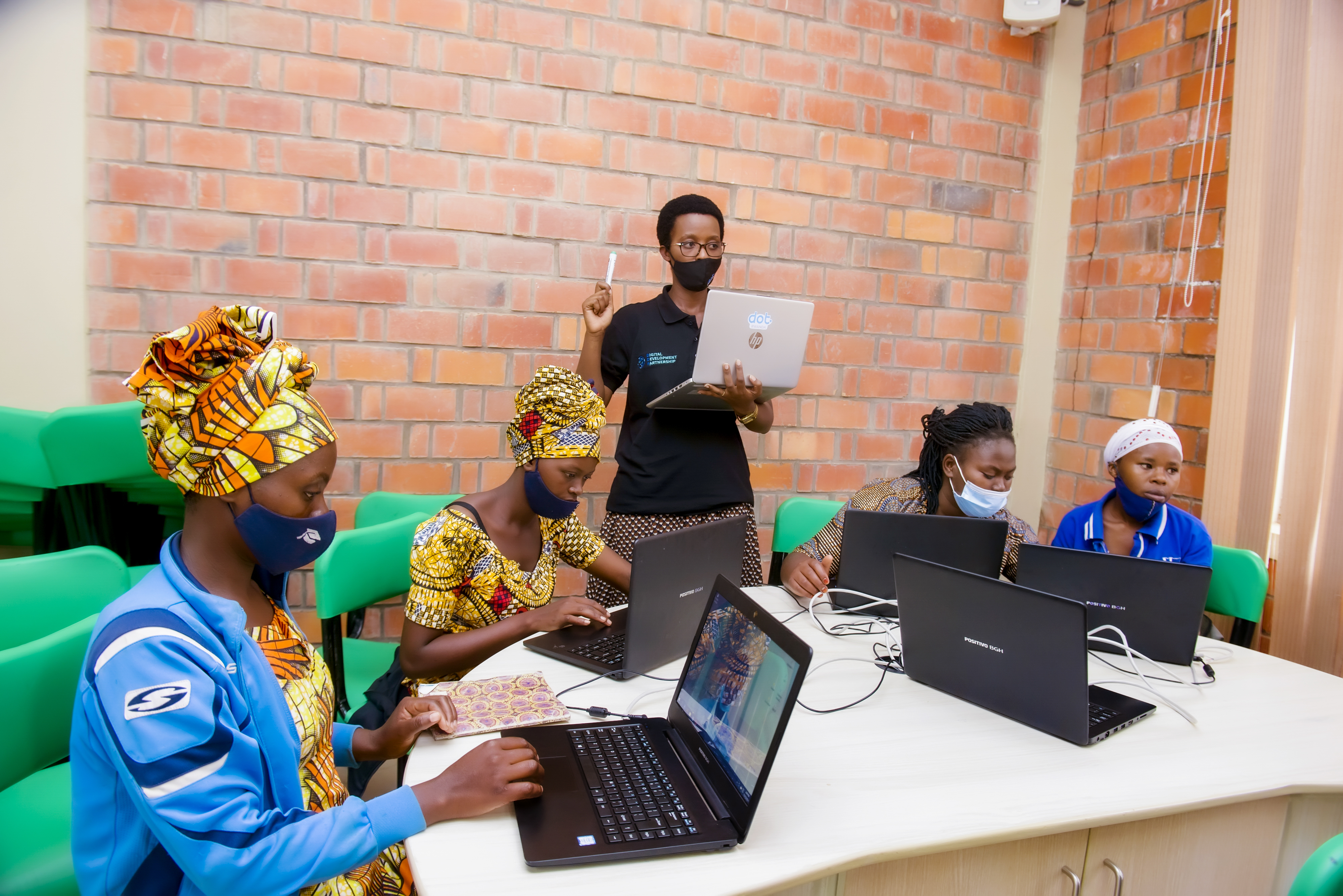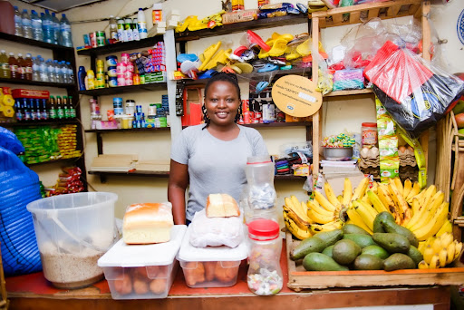Digital Skills for Business to Bridge the Gender Digital Divide
Known as the “land of a thousand hills”, Rwanda is one of the continent’s smallest nations, and boasts a youthful population – the median age in Rwanda is 20. Rwanda is asserting itself as a major information and technology hub, as part of the country’s ambitious plan to become an industrial and technological service centre for Africa.

With eyes firmly set on the future, Rwanda has made significant progress and expansion in digitally-enabled initiatives. However, large gaps remain in embedding basic digital skills, particularly for young women essential for livelihood creation. According to the Rwanda Ministry of ICT and Innovation (MINICT) computer literacy at a national level is as low as 8.4% for even the most basic digital services and applications, and 94% of women do not know how to use a computer.
Micro and Small Medium Enterprises (MSMEs), which dominate the local commercial landscape, have generally been slow to adopt online business practices. Many businesses and consumers remain wary of conducting business electronically, and often fail to see the potential benefits, in terms of facilitating access to new markets and services. Female entrepreneurs face several barriers such as digital skills training, affordable access to ICT, socio-cultural restraints, as well as access, control, and ownership of financial resources.
Although the COVID-19 pandemic catalyzed rapid uptake in technology as a critical tool to adapt, pivot, connect and thrive, the impact of COVID-19 has been particularly severe for smaller enterprises and young women entrepreneurs who face unprecedented challenges in sustaining their businesses. Many are still unable to access, connect and leverage technology – a gender digital divide persists.
In order to work towards Rwanda’s vision of the future, Digital Opportunity Trust Rwanda (DOT Rwanda), a branch office of the DOT network, is proud to offer scalable and replicable Digital Skills for Business program aimed at increasing digital literacy, driving digital adoption, entrepreneurship, and technology-enabled social innovations to foster community growth and bridge the gender digital divide amongst young women (18-35) who are owners of formal and informal businesses across urban and rural geographies in Rwanda.
In partnership with the World Bank’s Digital Development Partnership (DDP) , EQUALS’ Access Coalition and the GSMA, DOT Rwanda implemented a Digital Skills for Business (DS4B) pilot project targeting women entrepreneurs in 7 communities (Nyarugenge, Rulindo, Musanze, Rubavu, Kamonyi, Kayonza and Rwamagana) to boost their ICT knowledge, identify and leverage growing digital ecosystems, and integrate new digital tools to improve their business outcomes.

DS4B prioritized the leadership and agency of young women as Digital Champions, role models, collaborators and entrepreneurs in their communities who trained, lead, mentored and coached other entrepreneurs in their communities. The DS4B pilot is delivered by young women, for young women. It highlights the transformative power of young women’s leadership when supported by an ecosystem of partners. Based on intentional efforts to create enabling ecosystems of safety, connectedness and trust, DS4B was delivered in a group setting with other women who have similar backgrounds, educational levels, and familiarity with technology.
Outcomes from the pilot project revealed that Digital Skills training improves the use and integration of digital tools for business purposes:
-
183 young women entrepreneurs received training and upskilling from 15 DOT trained Digital Champions, and 10 Women Researchers led the needs assessments for the projects;
-
77% increase of skills across all levels of ICT skills and abilities ranging from sending emails, using e-government services, social media, to selling a product/service online;
-
44% increase in smartphone ownership and 15% increase in adopting e-wallets;
-
46% increase in daily use of mobile money transactions – 53% of which was used for purchasing and making payments;
-
80% reported a high level of awareness on the importance of digital safety and security.
We need initiatives that are transformative for individuals, communities and the economic growth of the country.
Anna Belle Mutuyimana is one of many positively impacted by DS4B (Read about the others here)
Anne Belle Mutuyimana, a 25 year old young woman from Rwamagana District, Muhazi sector, is a university student equipped with a feature phone and a smartphone, and an entrepreneur. Anne operates a mini supermarket where she sells vegetables, snacks, and house supplies, among other products.
She joined the Digital Skills for Business program, with the aim of gaining business and digital skills to improve her business activities.
“Before joining the program, I was doing business without any business skills. I didn’t know how to treat customers. I didn’t know how to face the competition. Now I am using my smartphone to market my products. My income has increased and the business is becoming wide because I have been adding some items according to my customers’ needs.”
The successful completion of the DS4B pilot project contributes to DOT’s advocacy towards investment into developing a long-term scaleable project that continues to drive reach and impact in Rwanda.
DOT mobilizes and inspires underserved and disadvantaged young people with digital literacy, 21st-century skills and the self-confidence that will enable them to thrive in an inclusive digital economy. The Digital Skills for Business project contributes to DOT’s commitment to the EDISON Alliance’s 1 Billion Lives Challenge to deliver digital literacy and 21st-century skills in the marginalized communities and schools of Africa and the Middle East, to reach an additional 1 million people by 2025.
Are you our next Community Leader, Digital Champion, or Social Innovator? Learn more about how to join #DOTYouth
Join #DOTYouthShare this Post
More ARTICLES
Read more like this.
